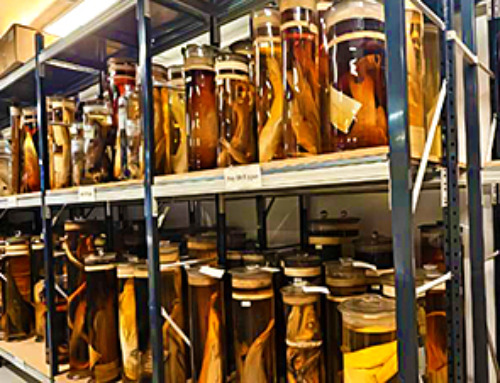The trial will evaluate the effectiveness and safety of a new vaccine compared to an FDA-approved mRNA vaccine.
University of Georgia-based startup CyanVac LLC has received federal funding to conduct a Phase 2b clinical trial to compare its intranasal vaccine candidates, CVXGA, which are designed to provide protection against COVID-19.
As part of the award from Project NextGen, a federal initiative based in the U.S. Department of Health and Human Services (HHS), CyanVac will sponsor a randomized, double-blind Phase 2b study with 10,000 participants to compare the efficacy and safety of the intranasal vaccine against an FDA-approved mRNA-based COVID-19 vaccine.
The new vaccine is based on a viral delivery platform developed by He containing modified strains of parainfluenza virus 5, which causes kennel cough in dogs but is relatively harmless to humans.
Parainfluenza virus 5 (PIV5) is a member of the Paramyxoviridae family known to infect dogs, leading to respiratory illnesses similar to kennel cough. It can also infect other mammals, including humans, typically causing mild respiratory symptoms. The virus is airborne and spreads through respiratory droplets, necessitating good hygiene and isolation practices to control outbreaks.
CyanVac's Commitment and Project Goals
CyanVac was founded by Biao He, Regents' Entrepreneur, Fred C. Davison Distinguished University Chair in Veterinary Medicine and a faculty member in UGA's College of Veterinary Medicine (CVM). He served on a White House panel to advise on the future of COVID-19 vaccines and was named both UGA Inventor and Entrepreneur of the Year.
"We are very excited about this opportunity to test a novel intranasal COVID vaccine whose technology platform has been developed at UGA," said He, who is based in UGA's Department of Infectious Diseases. "The name of our vaccine—CVXGA—is a tribute to UGA and CVM whose support over the years made this possible."
Project NextGen's goal is to advance new, innovative vaccines and therapeutics that provide longer-lasting and more durable protection against COVID-19. The award is one of the first made through the Rapid Response Partnership Vehicle, a consortium funded by the HHS Biomedical Advanced Research and Development Authority (BARDA) to accelerate product and technology development.
The Phase 2b study, which will begin this fall, will be carried out by BARDA's Clinical Studies Network, focusing on evaluating the vaccine in a subset of participants who are at a higher risk of severe disease.
News
Scientists Find Way to Turn Tumor-Protecting Cells Into Cancer Killers
A new cancer therapy wakes up immune cells inside tumors and turns them against cancer. Tumors contain immune cells called macrophages that are naturally capable of attacking cancer. However, the tumor environment blocks these [...]
Analyzing Darwin’s specimens without opening 200-year-old jars
Scientists have successfully analyzed Charles Darwin's original specimens from his HMS Beagle voyage (1831 to 1836) to the Galapagos Islands. Remarkably, the specimens have been analyzed without opening their 200-year-old preservation jars. Examining 46 [...]
Scientists discover natural ‘brake’ that could stop harmful inflammation
Researchers at University College London (UCL) have uncovered a key mechanism that helps the body switch off inflammation—a breakthrough that could lead to new treatments for chronic diseases affecting millions worldwide. Inflammation is the [...]
A Forgotten Molecule Could Revive Failing Antifungal Drugs and Save Millions of Lives
Scientists have uncovered a way to make existing antifungal drugs work again against deadly, drug-resistant fungi. Fungal infections claim millions of lives worldwide each year, and current medical treatments are failing to keep pace. [...]
Scientists Trap Thyme’s Healing Power in Tiny Capsules
A new micro-encapsulation breakthrough could turn thyme’s powerful health benefits into safer, smarter nanodoses. Thyme extract is often praised for its wide range of health benefits, giving it a reputation as a natural medicinal [...]
Scientists Develop Spray-On Powder That Instantly Seals Life-Threatening Wounds
KAIST scientists have created a fast-acting, stable powder hemostat that stops bleeding in one second and could significantly improve survival in combat and emergency medicine. Severe blood loss remains the primary cause of death from [...]
Oceans Are Struggling To Absorb Carbon As Microplastics Flood Their Waters
New research points to an unexpected way plastic pollution may be influencing Earth’s climate system. A recent study suggests that microscopic plastic pollution is reducing the ocean’s capacity to take in carbon dioxide, a [...]
Molecular Manufacturing: The Future of Nanomedicine – New book from Frank Boehm
This book explores the revolutionary potential of atomically precise manufacturing technologies to transform global healthcare, as well as practically every other sector across society. This forward-thinking volume examines how envisaged Factory@Home systems might enable the cost-effective [...]
New Book! NanoMedical Brain/Cloud Interface – Explorations and Implications
New book from Frank Boehm, NanoappsMedical Inc Founder: This book explores the future hypothetical possibility that the cerebral cortex of the human brain might be seamlessly, safely, and securely connected with the Cloud via [...]
Global Health Care Equivalency in the Age of Nanotechnology, Nanomedicine and Artificial Intelligence
A new book by Frank Boehm, NanoappsMedical Inc. Founder. This groundbreaking volume explores the vision of a Global Health Care Equivalency (GHCE) system powered by artificial intelligence and quantum computing technologies, operating on secure [...]
Miller School Researchers Pioneer Nanovanilloid-Based Brain Cooling for Traumatic Injury
A multidisciplinary team at the University of Miami Miller School of Medicine has developed a breakthrough nanodrug platform that may prove beneficial for rapid, targeted therapeutic hypothermia after traumatic brain injury (TBI). Their work, published in ACS [...]
COVID-19 still claims more than 100,000 US lives each year
Centers for Disease Control and Prevention researchers report national estimates of 43.6 million COVID-19-associated illnesses and 101,300 deaths in the US during October 2022 to September 2023, plus 33.0 million illnesses and 100,800 deaths [...]
Nanomedicine in 2026: Experts Predict the Year Ahead
Progress in nanomedicine is almost as fast as the science is small. Over the last year, we've seen an abundance of headlines covering medical R&D at the nanoscale: polymer-coated nanoparticles targeting ovarian cancer, Albumin recruiting nanoparticles for [...]
Lipid nanoparticles could unlock access for millions of autoimmune patients
Capstan Therapeutics scientists demonstrate that lipid nanoparticles can engineer CAR T cells within the body without laboratory cell manufacturing and ex vivo expansion. The method using targeted lipid nanoparticles (tLNPs) is designed to deliver [...]
The Brain’s Strange Way of Computing Could Explain Consciousness
Consciousness may emerge not from code, but from the way living brains physically compute. Discussions about consciousness often stall between two deeply rooted viewpoints. One is computational functionalism, which holds that cognition can be [...]
First breathing ‘lung-on-chip’ developed using genetically identical cells
Researchers at the Francis Crick Institute and AlveoliX have developed the first human lung-on-chip model using stem cells taken from only one person. These chips simulate breathing motions and lung disease in an individual, [...]






















